Parkinson’s disease is a progressive neurodegenerative disorder that affects millions of people worldwide.
Often characterised by its hallmark symptoms, such as tremors, rigidity, and bradykinesia (slowness of movement), Parkinson’s disease encompasses a much broader range of effects on individuals and their daily lives. Despite its prevalence, several misconceptions surround the disease, contributing to misunderstandings about its nature and impact. This article aims to shed light on the complexities of this disease, clarifying common misconceptions and highlighting the diverse experiences of those living with it.
What is Parkinson’s disease?
Parkinson’s disease primarily affects the brain’s ability to produce dopamine, a neurotransmitter crucial for coordinating movement. The loss of dopamine-producing neurons in a part of the brain (called the substantia nigra) leads to the motor symptoms commonly associated with the disease. While the exact cause of Parkinson’s disease remains unclear, it is believed to result from a combination of genetic and environmental factors.

Common misconceptions
- It only affects older adults: Many people believe Parkinson’s is an ailment exclusively of the elderly. While age is a significant risk factor, individuals in their 30s and 40s can also develop early-onset Parkinson’s, challenging the stereotype of it being a disease of old age.
- Tremors are the only symptom: While resting tremors are a well-known symptom, they represent only one aspect of the disease. Other motor symptoms include stiffness, balance problems, and a shuffling gait. Furthermore, non-motor symptoms can be just as debilitating.
- All patients experience the same symptoms: Parkinson’s disease manifests differently in each person. Some may experience severe tremors, while others might have minimal shaking but face significant challenges with rigidity or cognitive decline. The progression of symptoms also varies widely.
- The disease is terminal: Although Parkinson’s is a progressive condition, it is not classified as terminal. Many people live for years with the disease, and advancements in treatment options (including medication and deep brain stimulation) can significantly improve quality of life.
- It only affects movement: This misconception undermines the complexity of Parkinson’s disease. Beyond the motor symptoms, individuals may experience cognitive decline, mood disorders (like depression and anxiety), sleep disturbances, and autonomic dysfunction (which can affect blood pressure and digestion).

The broader impact
Living with Parkinson’s disease is often a multifaceted challenge that extends beyond the physical symptoms. Here are some of the broader impacts the condition has on individuals and their families:
- Emotional and psychological effects: The diagnosis of Parkinson’s can lead to feeling of anxiety, depression, and social isolation. The uncertainty of disease progression and the fear of losing independence can weigh heavily on patients and their loved ones.
- Cognitive changes: Many people with the disease experience cognitive decline, including issues with attention, memory, and executive function. This can complicate everyday tasks and decision-making, further impacting the individual’s quality of life.
- Social relationships: Parkinson’s disease can alter social dynamics. Friends and family may not understand the non-visible symptoms, leading to frustration and isolation for the individual. Open communication and education about the disease are vital for maintaining healthy relationships.
- Economic burden: The costs associated with Parkinson’s, including medical treatments, therapy, and potential loss of income due to disability, can create financial strain. This adds an additional layer of stress for those affected and their families.

Understanding Parkinson’s disease requires a comprehensive perspective that acknowledges both its motor and non-motor symptoms. Dispelling common misconceptions is crucial for promoting empathy and support for those living with this complex condition. As research continues to advance, raising awareness and promoting education can lead to improved resources, treatments, and ultimately, a better quality of life for individuals affected by the disease. Institutions, like KC Skills Centre, provide specialised training in this area and play a vital role in equipping health and care industry professionals with the knowledge and skills necessary to offer high-quality, compassionate care.
By investing in education and support, we can help ensure those living with Parkinson’s disease receive the care and understanding they deserve. If you are interested in learning more about Parkinson’s disease, KC Skills Centre offers an industry-recognised Parkinson’s disease course that is available online and in-person. See our website for more details, or contact us on (08) 8340 6875. To request a group or offsite session, fill out an online enquiry form.


